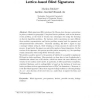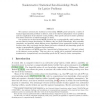159
click to vote
PKC
2012
Springer
13 years 4 months ago
2012
Springer
We initiate the study of security for key-dependent messages (KDM), sometimes also known as “circular” or “clique” security, in the setting of identity-based encryption (I...
117
click to vote
IACR
2011
14 years 1 months ago
2011
We give direct constructions of pseudorandom function (PRF) families based on conjectured hard lattice problems and learning problems. Our constructions are asymptotically effici...
143
click to vote
ASIACRYPT
2011
Springer
14 years 2 months ago
2011
Springer
A cryptographic assumption is the (unproven) mathematical statement that a certain computational problem (e.g. factoring integers) is computationally hard. The leakage-resilience l...
135
click to vote
ASIACRYPT
2010
Springer
15 years 2 days ago
2010
Springer
Blind signatures (BS), introduced by Chaum, have become a cornerstone in privacy-oriented cryptography. Using hard lattice problems, such as the shortest vector problem, as the bas...
124
click to vote
CRYPTO
2008
Springer
15 years 3 months ago
2008
Springer
We construct noninteractive statistical zero-knowledge (NISZK) proof systems for a variety of standard approximation problems on lattices, such as the shortest independent vectors...
128
click to vote
ASIACRYPT
2008
Springer
15 years 4 months ago
2008
Springer
In this paper, we show that two variants of Stern's identification scheme [IEEE Transaction on Information Theory '96] are provably secure against concurrent attack unde...
118
click to vote
FOCS
2004
IEEE
15 years 5 months ago
2004
IEEE
We show that finding small solutions to random modular linear equations is at least as hard as approximating several lattice problems in the worst case within a factor almost line...
PKC
2007
Springer
15 years 8 months ago
2007
Springer
Abstract. We propose multi-bit versions of several single-bit cryptosystems based on lattice problems, the error-free version of the Ajtai-Dwork cryptosystem by Goldreich, Goldwass...



